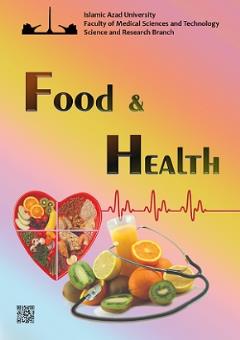Study of the Effect of Quinoa Flour and Gellan Gum Replacement on the Physicochemical and Organoleptic Properties of Low-Fat Hamburgers
محورهای موضوعی : Food and Health
Maryam Shariat
1
,
Hamed Ahari
2
![]() ,
Shadi Mahdikhani
3
,
Sima Moradi
4
,
Seyed Amir Ali Anvar
5
,
Shadi Mahdikhani
3
,
Sima Moradi
4
,
Seyed Amir Ali Anvar
5
1 - Department of Food Science and Technology, Science and Research Branch, Islamic Azad University, Tehran, Iran
2 - Department of Food Science and Technology, Science and Research Branch, Islamic Azad University, Tehran, Iran
3 - Department of Food Science and Technology, Shahre-Ghods Branch, Islamic Azad University, Tehran, Iran
4 - Department of Food Hygiene, Science and Research Branch, Islamic Azad University, Tehran, Iran
5 - Department of Food Hygiene, Science and Research Branch, Islamic Azad University, Tehran, Iran
کلید واژه: Quinoa flour, / Gellan gum, / Low-Fat hamburger/, Antioxidant,
چکیده مقاله :
There is growing interest in incorporating plant- and bacteria-derived ingredients with unique nutritional benefits for product reformulation. This study investigated the impact of quinoa flour and gellan gum substitution on low-fat hamburgers' physicochemical and sensory characteristics. The objective was to evaluate the effects of quinoa flour and gellan gum on low-fat hamburgers' physicochemical and sensory properties. Five hamburger samples (50 g each) were formulated with varying quinoa flour and gellan gum levels. Physicochemical analyses were performed, including moisture, protein, fat, ash, and carbohydrate content. Antioxidant activity, measured by pH and thiobarbituric acid index, was assessed on days 1, 14, and 28. Sensory evaluation encompassed color assessment, texture profile analysis, and a hedonic consumer test. Increasing quinoa flour and gellan gum levels synergistically decreased the thiobarbituric acid index compared to the control sample. Texture profile analysis revealed no significant differences in hardness, adhesion, elasticity, or chewiness among the samples. Likewise, no significant sensory differences were observed. The incorporation of quinoa flour in conjunction with gellan gum improved physicochemical properties, enhanced antioxidant activity, and maintained acceptable sensory attributes in low-fat hamburgers. Sample E3 (67% lean minced meat, 0% soy flour, 0.1% quinoa flour, 0.5% gellan gum, 14.5% fat) exhibited the most desirable characteristics. In contrast, sample A1 (74% lean minced meat, 0% soy flour, 0.03% quinoa flour, 0% gellan gum, 0.15% fat) was the least favorable compared to the control.
There is growing interest in incorporating plant- and bacteria-derived ingredients with unique nutritional benefits for product reformulation. This study investigated the impact of quinoa flour and gellan gum substitution on low-fat hamburgers' physicochemical and sensory characteristics. The objective was to evaluate the effects of quinoa flour and gellan gum on low-fat hamburgers' physicochemical and sensory properties. Five hamburger samples (50 g each) were formulated with varying quinoa flour and gellan gum levels. Physicochemical analyses were performed, including moisture, protein, fat, ash, and carbohydrate content. Antioxidant activity, measured by pH and thiobarbituric acid index, was assessed on days 1, 14, and 28. Sensory evaluation encompassed color assessment, texture profile analysis, and a hedonic consumer test. Increasing quinoa flour and gellan gum levels synergistically decreased the thiobarbituric acid index compared to the control sample. Texture profile analysis revealed no significant differences in hardness, adhesion, elasticity, or chewiness among the samples. Likewise, no significant sensory differences were observed. The incorporation of quinoa flour in conjunction with gellan gum improved physicochemical properties, enhanced antioxidant activity, and maintained acceptable sensory attributes in low-fat hamburgers. Sample E3 (67% lean minced meat, 0% soy flour, 0.1% quinoa flour, 0.5% gellan gum, 14.5% fat) exhibited the most desirable characteristics. In contrast, sample A1 (74% lean minced meat, 0% soy flour, 0.03% quinoa flour, 0% gellan gum, 0.15% fat) was the least favorable compared to the control.


